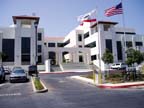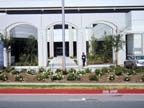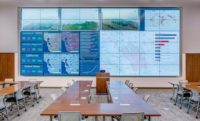

Last April, Corona contracted for an access control and intrusion alarm system at its new city hall installed by SDA Security Systems Inc., a family-owned security equipment provider and installation company with offices in San Diego and Riverside, Calif. The company – which has been in business for 75 years – is turning its focus to large, commercial integration projects in response to current industry trends.
“It’s a whole new ball game, as far as security technology goes,†declared Jason Beardsley, SDA regional sales manager. “Security needs are evolving, and so is technology. So security companies like us are evolving our services to meet these new demands.â€
Added Steve Gulczynski, SDA’s regional operations manager, “This is one of the larger integrated systems that we’ve installed to date, and it more or less proves that we are capable of handling the larger integrated security projects. We have the sales and installation professionals in place to move into the integrated systems market in a big way in the future.â€
Corona wanted a system that could be expanded to incorporate all of its facilities. The system’s alarms and access card readers are tied together through Honeywell’s WIN-PAK PRO access control software, which allows users to monitor events and alarms from central or remote locations. The software also lets administrators automate functions, such as creating customized alarm reports and photo I.D. badging.
City officials can monitor the entire security system from a single internal location. After hours, dispatchers in the neighboring police station monitor the system’s cameras and intrusion alarms.
“Providing peace of mind to our customers, that’s how we stay in business,†Gulczynski noted.
SDA outfitted 84 doors at the city hall with Honeywell access card readers. The building is divided into 13 access-controlled areas. With other systems the city considered using, each section of the building would have had a designated number of codes or “slots†that could be assigned to users. But some employees need access to multiple areas, and therefore would have to be assigned multiple slots.
“So you might have 900 total slots on a system, but you might end up with only 300 people who can access the facility,†explained Curtis Showalter, the city’s public works manager.
With the system, employees can access multiple areas through a single code on their cards, and system administrators can determine which areas each card can access. This directly correlates the 900 “slots†with 900 different users, and one person can access any door or be restricted from any door in the facility.
The use of cards also eliminates the need for employees to physically arm and disarm an alarm system when they enter a secured area. If a user attempts to enter an unauthorized area, the system will flag the incident as an “invalid read†on the system’s customized access report.
The software also tells users if doors are locked and gives them the capability to control the locks from a work station or a remote location. This comes in handy for police after hours, because dispatchers can give officers access to an area simply by unlocking doors from their work stations.
“That saves them manpower and labor costs,†Beardsley pointed out. “They don’t have to worry about sending someone over there to verify if a particular door is locked.â€
Besides access control technology, SDA provided the city hall with full intrusion protection, including glass-breakage sensors, magnetic door contact sensors, holdup buttons and a closed-circuit video surveillance system that can be monitored internally and from the dispatch center.
Currently, 14 video surveillance cameras (analog cameras that record information into digital video recorders) are in various locations throughout the facility. Users can view live and/or recorded video from their computer work stations. The system can be expanded in the future to include an additional 64 cameras.
The video system’s greatest benefit for city officials is the ability to keep track of people as they move through the building. It also improves response time and effectiveness for police in the event of an emergency.
“With the video in place, the police will be able to see what’s going on, say, when a panic button is hit,†Beardsley explained. “They’ll have prior knowledge of the situation versus going in blindly, and that obviously works to their advantage.â€
If an alarm is triggered after hours, police can use the network software to find the exact location of the alarm and then use the nearest cameras to investigate before an officer ever arrives. By using the cameras, dispatchers can see whether someone has broken into the building or if the alarm was tripped inadvertently. From that, dispatchers can decide whether to send officers or call a building maintenance worker.
Corona officials are hoping to install similar access and intrusion systems in each city facility in the next few years. In the meantime, they expect city hall to serve as a model of a well-rounded, effective and preventive security system.
“We owe it to our taxpayers to have the best maintenance for the facility and the security to protect our assets and our people,†Showalter emphasized. That sense of security is strengthened by the growing trust among the three partners.
“It’s our goal to prove to the city that we can be their long-term partner of choice, just as Honeywell proved the same to us,†pointed out Shandon Harbour, SDA’s director of sales and operations. “Honeywell has been with us for the smaller projects in the past, so we were excited to work with them on this larger scale.â€




